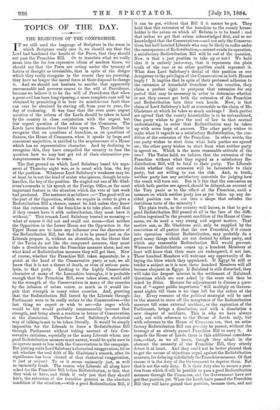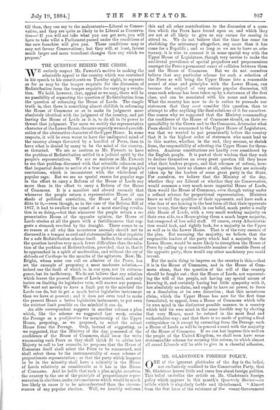TOPICS OF THE DAY.
THE REJECTION OF THE COMPROMISE.
IF we still used the language of Scripture in the sense in which Scripture really uses it, we should say that the Lord had hardened the hearts of the Peers, that they should not pass the Franchise Bill. Or to translate what we really mean into the far less expressive idiom of modern times, we should say that the Peers are acting under the tyranny of habits of thought so irresistible, that in spite of the danger which they really recognise in the course they are pursuing, they have no longer the moral force at their disposal to change it. And we should not hesitate to ascribe that apparently unreasonable and perverse course to the will of Providence, because we believe it to be the will of Providence that when a great evil has been long ripening, a more complete cure will be obtained by permitting it to bear its mischievous fruit than can ever be obtained by staving off, from year to year, the day of reckoning. It was time that the even more urgent question of the reform of the Lords should be taken in hand by the country in close conjunction with the urgent but less urgent question of the reform of the Commons. The Lords have themselves forced this upon us. They decline to recognise that on questions of franchise, as on questions of finance, the House of Commons, when it speaks by large and consistent majorities, is entitled to the acquiescence of a House which has no representative character. And by declining to recognise this, they have compelled the country to face the question how we may best get rid of their obstructive pre- sumptuousness in time to come.
The first ground on which Lord Salisbury based his argu- ment of Thursday night was, as is usual with him, the key of the position. Whatever Lord Salisbury's weakness may be, at least he is not the kind of orator who ignores, though he mis- handles, the key of the position. He singled out one of Mr. Glad- stone's remarks in his speech at the Foreign Office, as the most important feature in the situation which the vote of last week had produced. The sentence is as follows :—" The good-will on the part of the Opposition, which we require in order to give a Redistribution Bill a chance, cannot be had unless they know that the extension of the franchise is to take place, and that if they cannot have it with redistribution, they must have it without." This remark Lord Salisbury treated as meaning— what of course it did not and could not mean—that neither the Opposition in the Lower House nor the Opposition in the Upper House are to have any influence over the character of the Redistribution Bill, but that it is to be passed just as the Liberals propose it, without an alteration, on the threat that if the Tories do not like the compound measure, they must take a dissolution under the Franchise measure alone, and see what kind of Redistribution measure they will get then. Now of course, whether the Franchise Bill, taken separately, be a pistol at the head of the Conservative party or not, we all know that it is not a threat of death, or even of serious para- lysis, to that party. Looking to the highly Conservative character of many of the Lancashire boroughs, it is probable enough that the Franchise Bill, even taken alone, would add to the strength of the Conservatives in many of the counties by the infusion of urban voters, as much as it would im- pair that strength in many other counties. And, granting that the Redistribution Bill forced by the Liberals through Parliament were to be really unfair to the Conservatives—the last thing we expect or wish to see—the anger which would be felt would probably immeasurably increase that strength, and bring about a reaction in favour of Conservatism at the dissolution. Therefore Lord Salisbury's rhetorical way of talking is not to be taken literally. It would be simply impossible for the Liberals to force a Redistribution Bill through Parliament without taking account of fair Con- servative criticism, especially as the many Liberals whom any good Redistribution measure must unseat, would be quite sure to co-operate more or less with the Conservatives in the campaign. But putting aside Lord Salisbury's rhetorical exaggeration, let us ask whether the real drift of Mr. Gladstone's remark, after its significance has been cleared of that rhetorical exaggeration, is just or unjust? To us it seems eminently just, as well as eminently frank. The reason why Liberals all along have asked for the Franchise Bill before Redistribution, is this, that they wish to have, and think it only just that they should have, the extension of the franchise granted as the absolute condition of the situation,—with a good Redistribution Bill, if
it can be got, without that Bill if it cannot be got. They hold that this extension of the franchise to the county house- holder is the axiom on which all Reform is to be based ; and that unless we get that axiom acknowledged first, and so ac- knowledged that the Conservatives—and not only the Conserva- tives, but half-hearted Liberals who may be likely to suffer under the consequences of Redistribution,—cannot evade its operation, a satisfactory Redistribution Bill will be out of the question.. Now, is that a just position to take up or not? We hold that it is entirely just—nay, that it represents the plain truth of the case as no other position could represent it. What does Lord Salisbury's denial of this position as one derogatory to the privileges of the Conservatives in both Houses. imply ? It implies that in spite of their professed adhesion to- the extension of household franchise to the counties, they claim a perfect right to postpone that extension for any period that may be necessary in order to determine whether or not they cannot get both the extension of the Franchise and Redistribution into their own hands. Now, is that claim of Lord Salisbury's half as reasonable as the claim of Mr. Gladstone at which he takes so much umbrage ? Both parties are agreed that the county householder is to be enfranchised. One party wishes to give the seal of law to that mutual understanding, in order that Redistribution may be taken• up with more hope of success. The other party wishes to make what it regards as a satisfactory Redistribution, the con- dition of the extension of the Franchise. In other words, the one party wishes to start from what both parties are agreed on ; the other party wishes to start from what neither party is agreed on. Which is the more reasonable attitude of the two ? The Tories hold, we believe, that the extension of the Franchise without what they regard as a satisfactory Re- distribution Bill, will be fatal to their party. The Liberals doubt whether that extension will be favourable to their party, but are willing to run the risk. And, in truth, neither party has any satisfactory materials for judging how the result will turn out. But is it fair that the concession on which both parties are agreed, should be delayed, on account of the Tory panic as to the effect of the Franchise, until a measure on which neither party has as yet taken up any de- cided position can be cut into a shape that satisfies the fastidious taste of the minority ?
The plain truth, as the country well knows, is that to get a good Redistribution Bill passed at all in the face of the diffi- culties ingrainedin the present condition of the House of Com- mons, we do need a very strong and urgent motive. That motive can, as Mr. Gladstone said, only be supplied by the conviction of all parties that the new Franchise, if it comes into operation without Redistribution, may probably do a good many things which are not desired by either party, and which any reasonable Redistribution Bill would prevent. Whenever Redistribution comes up, a hundred Members at least will know that their seats are endangered, if not lost. These hundred Members will welcome any opportunity of de- laying the blow which they apprehend. If Egypt be still as tender a subject as it is now, these hundred Members will all become eloquent on Egypt. If Zululand is still disturbed, they will take the deepest interest in the settlement of Zululand. Questions which are now asked by the score will then be asked by fifties. Motions for adjournment to discuss a ques- tion of "urgent public importance" will multiply on Govern- ment nights till there is no time left for the orders of the day. Every resource of the political strategist will be used to the utmost to stave off the acceptance of the Redistribution measure till some external accident, or the expiration of the Parliament, brings a dissolution, and with a dissolution a new chapter of accidents. This is why we have always said, not with reference to the House of Lords only, but with reference to the House of Commons too, that no satis- factory Redistribution Bill can possibly be passed, without the leverage of an already passed Franchise Bill to carry it. As regards the House of Lords, there is this additional considera- tion,—that, as we all know, though they admit in the abstract the necessity of the Franchise Bill, they utterly detest it at heart. And they could not be better pleased than to get the excuse of objections urged against the Redistribution measure, for delaying indefinitely the Franchise measure. Of that excuse it is the duty of the Government to deprive them. But that is not the only duty. It is their duty also to secure a posi- tion from which it will be possible to pass a good Redistribution measure through the Commons, and the Government have not got that position yet. When the Lords have passed the Franchise Bill they will have gained that position, because then, and not
till then, they can say to the malcontents—Liberal or Conser- vative, and they are quite as likely to be Liberal as Conserva- tive—' If you will not take what you can get now, you will have to take what a Parliament passed under the conditions of the new franchise will give you. Those conditions may or may not favour Conservatives ; but they will, at least, favour much larger and more trenchant changes than any which we propose.'



































 Previous page
Previous page